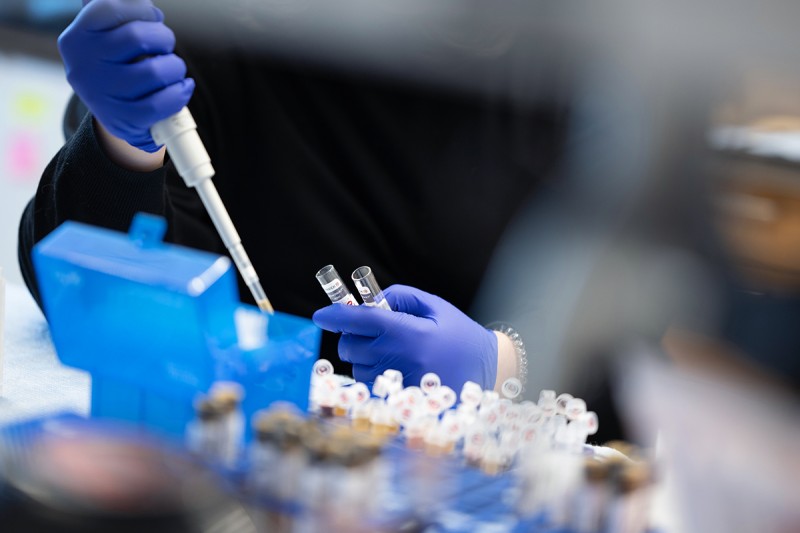
New research from Memorial Sloan Kettering Cancer Center (MSK) and the Sloan Kettering Institute — MSK’s experimental research arm — explores novel predictors of immunotherapy effectiveness against lung cancer; identifies how a high-fat diet hinders intestinal damage repair; reports findings from a clinical trial for people with androgen receptor-positive salivary gland cancer; and aims to understand the impact of tumor mutational burden on patients with locally advanced non-small cell lung cancer.
Study suggests novel predictors of immunotherapy effectiveness against lung cancer
Immune checkpoint inhibitors have been a remarkable advance for the treatment of lung cancer. But most patients’ cancers either don’t respond to the treatment or the response is short-lived. A new study led by MSK medical oncologist Andrew Chow, MD, PhD, a member of the lab of co-senior author Charles Rudin, MD, PhD, used single-cell sequencing and the evaluation of more than 440 clinical samples to identify CD39 expression on CD8+ T cells as predictors of immunotherapy response. The findings demonstrated that PD-1 and CD39 expression on CD8+ T cells increases upon engagement of tumor targets, and the level of intra-tumoral CD39+ CD8+ T cells is predictive of improved outcomes from immune checkpoint blockade in lung cancer. Jedd Wolchok, MD, PhD, and Taha Merghoub, PhD, who were at MSK at the time of study, were also senior authors. Read more in Immunity.
High-fat diet impairs intestinal damage repair
It is well established that high-fat diets are bad for intestinal health, but the precise effect of these diets on tissue damage has been unclear. Researchers at the Sloan Kettering Institute and collaborators at Baylor College of Medicine recently published a mouse-model study demonstrating that a high-fat diet interferes with macrophages’ ability to clear out dead neutrophils, leading to tissue damage. “While diets high in fat have long been associated with human disease, our results indicate that high-fat diets not only increase inflammation after chronic exposure but also directly interfere with intestinal repair mechanisms,” says MSK immunologist Gretchen Diehl, PhD, co-senior author of the study. “Further study of this pathway may lead to new therapeutic targets to reduce intestinal disease and other inflammatory diseases.” Read more in JCI Insight.
Results from phase 2 study of enzalutamide for patients with androgen receptor-positive salivary gland cancers
Medical oncologist Alan Ho, MD, PhD, and team led a phase 2 trial evaluating enzalutamide in people with androgen receptor-positive salivary gland cancers, the first of its kind conducted in the U.S. Of 46 patients enrolled in the trial, only two confirmed responses were observed, though tumor regressions were achieved in the majority. The study data demonstrate that while the androgen receptor is a valid therapeutic target for salivary gland cancer, optimization of this treatment strategy likely requires androgen deprivation and further biomarker discovery. Read more in the Journal of Clinical Oncology.
Study shows benefit to patients with non-small cell lung cancer with high tumor mutational burden
To better personalize therapy, a team led by MSK radiation oncologist Narek Shaverdian, MD, conducted a study to examine whether a high number of mutations in a patient’s tumor — also known as tumor mutational burden — was associated with specific outcomes in patients with locally advanced non-small cell lung cancer who were treated with chemoradiation and the immunotherapy drug durvalumab. In the 81-patient cohort, a high tumor mutational burden was associated with significantly improved outcomes over a two-year period. The high number of mutations may make these tumors more sensitive to radiation and immunotherapy, the authors note. Read more in JAMA Network Open.